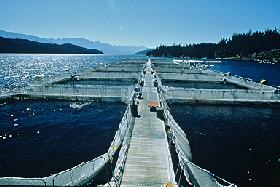|
Stressing that sea lice occur naturally in the wild, Blackburn and Grydeland said their companies will ensure that levels of sea lice on their individual farm sites are as low as possible by establishing a standardized program and treatment prototcols for their farms in the Broughton.
"We genuinely believe that our farms and the wild population of salmon are compatible and environmentally sustainable," said Blackburn. "At the same time, we want to be part of any solution. So, we're committed to working with government, the PFRCC, First Nations and local communities to ensure the health and future of our wild salmon population."
The First Nations who have fished the Broughton Archipelago for centuries are fed up with the fish farms. In April, the Musgamagw Tsawataineuk Tribal Council rallied community members from throughout Northern Vancouver Island to serve a symbolic eviction notice to fish farms operating in their traditional territory.
A flotilla of boats led by five war canoes gathered at the edge of the Broughton Archipelago, a previously pristine group of islands that is both a B.C. Marine Park and a home to 26 fish farms. "This protest is our way of saying 'we've tried everything else - enough is enough,'" said Yvon Gesinghaus of the Musgamagw Tsawataineuk Tribal Council. "They can take their friggin fish farms and put them somewhere else."
"We've spent 14 years going through all the government processes to file objections to these fish farms in our territories, and have yet to receive any response from the Ministers in charge," said Gesinghaus. "The Broughton Archipelago is our grocery store; it's where all our foods come from. These fish farms are polluting our waters by breaking their own restrictions because they've been left to police themselves."
Dr. David Suzuki, known for his television series "The Nature of Things," and numerous books, founded the environmental group that bears his name.
|

